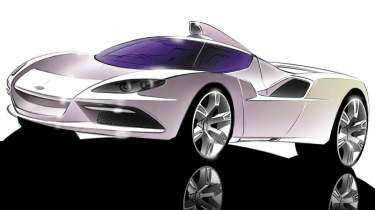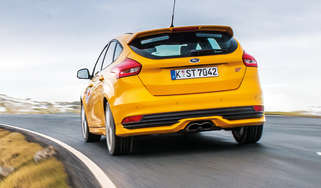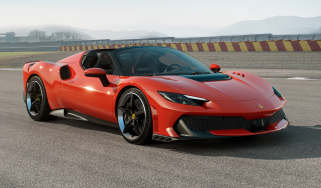Britain's bold new supercar
Creator of Farboud GTS returns with carbonfibre-bodied Lambo and Ferrari rival
Young entrepreneur and sports car enthusiast Arash Farboud is back in the supercar business with this stunning carbonfibre-bodied, £170,000 machine called the Arash Cars Ltd AF10, which will be launched at the London Motor Show (July 20-30) and has ‘good financial backing'. His previous venture, the Esprit-sized mid-engined Farboud GTS, is now at an advanced development stage but under the ownership of ex-Marcos man Chris Marsh.
Arash Farboud handed over the GTS project to Marsh when costs spiralled and he realised he lacked the experience to take the car into modest-scale production; he claims the lessons learned from that project ‘have reduced the development costs to a fraction of what they were the last time and have meant that this car has been a real pleasure to work on, really good fun.’
Farboud’s ambitions for the AF10 are far from humble, however. ‘The brief to our designer was that if you turn up at the traffic lights alongside a Ferrari Enzo, Pagani Zonda or a Koenigsegg, you won’t feel like you’re the poor relation.’ There’s also a strictly pragmatic reason for the move upmarket from the GTS – a contractual agreement with Chris Marsh means there has to be a hefty financial buffer between Farboud the company’s GTS and Farboud the individual’s new project.
Arash at first looked to Audi for a powerplant for the AF10. ‘We looked at Audi’s (Lamborghini-derived) V10 to start with,’ he says, ‘but it would have required so much recalibration that we would have had to pay about £250,000 for the work.’ And while he asserts that an absolutely final decision on engine choice is yet to be made, it’s 99.9 per cent certain that the AF10 will be powered by the mighty 7-litre V8 from the Chevrolet Corvette Z06.
‘This engine is now readily available from General Motors, it’s reliable and it’s emissions compliant,’ says Farboud. ‘We’ve changed the inlet and exhaust systems to raise power from the standard 505bhp to 550bhp, and we also have plans for a limited-edition big-power derivative with a quad-turbo set-up.’ If the AF10 achieves its target weight of 1100kg, then even the basic engine promises sensational performance. Drive is to the rear wheels via the same Graziano six-speed manual used in the Noble M15. Helping cut weight is that carbonfibre-composite bodywork and a carbon and steel chassis; Farboud hasn’t gone fully carbon for the latter – as Ascari has – to make it less troublesome to homologate the AF10 for endurance racing and maybe even Le Mans.
Although most of the design and engineering work for the AF10 has been undertaken in-house at the company’s Sawston, Cambridgeshire headquarters, Farboud admits to a bit of outside assistance. ‘I kept bumping into Michael Blaize from MB Roadcars at various events, and eventually asked him if there was any way of predicting aerodynamic and crash performance on computers. In terms of our development costs he beat the system – we won’t need to put the car into the wind tunnel until the final stages, just to fine-tune it, and we’re confident of its crashworthiness.’Farboud and his chassis expert, Ashley Gaunt, have kept the suspension simple, eschewing F1-style pushrods for a more conventional double-wishbone set-up that’s simpler to tune and less expensive to produce. However, he’s hoping the AF10 will have ceramic discs; AP Racing is already providing the six-pot front and four-pot rear callipers.Inside, the AF10 will feature the quilted leather upholstery currently beloved of upmarket sports car makers, together with bespoke switchgear and, hopes Farboud, airbags. Also on the cards are a touch-screen satnav system and an MP3 compatible hi-fi. And as proof that Farboud as a supercar owner understands the breed’s foibles, the AF10 will have a 100-litre fuel tank to extend the time between fill-ups.
Farboud expects to have prototypes out on the road by the end of this year, with the aim of going into production by September 2007. And while he’s looking to sell cars in the UK, Europe and the States, maximum production will be just 25 cars per year.




